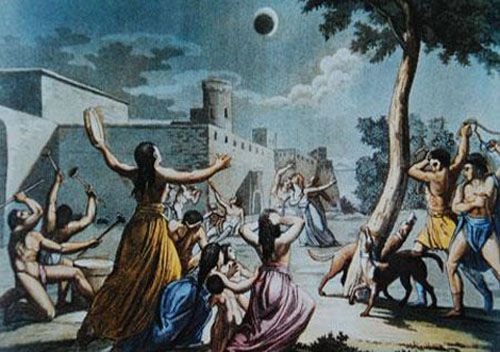Ancient people's explanation of solar eclipses
Thousands of years ago, people may not have considered solar eclipses to be a natural phenomenon, and even considered them a sign of impending doom.
The Vikings
The Vikings believed that Ragnarok (the end of the world) was caused by two wolves, Skoll and Hati, who wanted to eat the Sun and the Moon. Skoll chased the Sun while Hati chased the Moon. When either celestial body was in their hands, a solar eclipse would occur. On Earth, humans had to save the Sun or the Moon by making noise to scare away the wolves.
Ancient Egypt
Although sun worship was widespread in ancient Egypt, little is known about their beliefs surrounding eclipses, as there is almost no mention of solar eclipses.
Because the Sun played such a prominent role in society at the time, many experts believe that solar eclipses were a very frightening phenomenon. According to one theory, the ancient Egyptians feared them and considered them an omen.
 |
| Thousands of years ago, people believed that solar eclipses were bad omens, signs of a time of destruction. Photo: history.cultural-china.com |
Maya civilization
In 2013, researchers discovered evidence that the Maya may have accurately predicted solar eclipses.
An 11th- or 12th-century astronomical calendar predicted an eclipse on July 11, 1991. The eclipse was called chi' ibal kin, or "eating the Sun." However, what they believed or understood about eclipses remains unclear. By the 1600s, their writings had been destroyed.
Indian mythology
In mythology, the serpent Rahu (or Kala Rau) was beheaded by Lord Vishnu for drinking the nectar of the gods. Rahu wanted to drink the sacred nectar to become immortal and disguised himself as a woman to carry out this plan. After being beheaded, he flew into the sky, swallowed the Sun, sucking up the light and causing a solar eclipse.
Ancient Greece
In 2008, researchers said that the phenomenon of total solar eclipses may have been mentioned in the epic Odyssey: "The sun disappeared from the heavens and an evil mist began to cover the world." The ancient Greeks believed that total solar eclipses were a bad omen, a sign that the gods were angry and a period of natural disaster and destruction was about to begin.
China
In China, a solar eclipse is also a bad omen. For the ancient Chinese, this phenomenon occurred when a dragon ate the Sun. To prevent this from happening, they would sing, beat drums, use firecrackers or gunpowder to scare the dragon away.
Predicting solar eclipses was the job of astrologers. According to history, in 2134 BC, two astrologers were beheaded for failing to fulfill their duties.
Modern times
Total solar eclipses have occurred four times in the UK in the past century and have never been seen as the beginning of the end of the world. However, those who believe in the theory still think the eclipse should be seen as a warning sign of the arrival of almighty power.
Some say it is a message from God to the world. According to Jewish tradition, it is a warning to non-Jews and European countries to take note.
According to VnExpress






